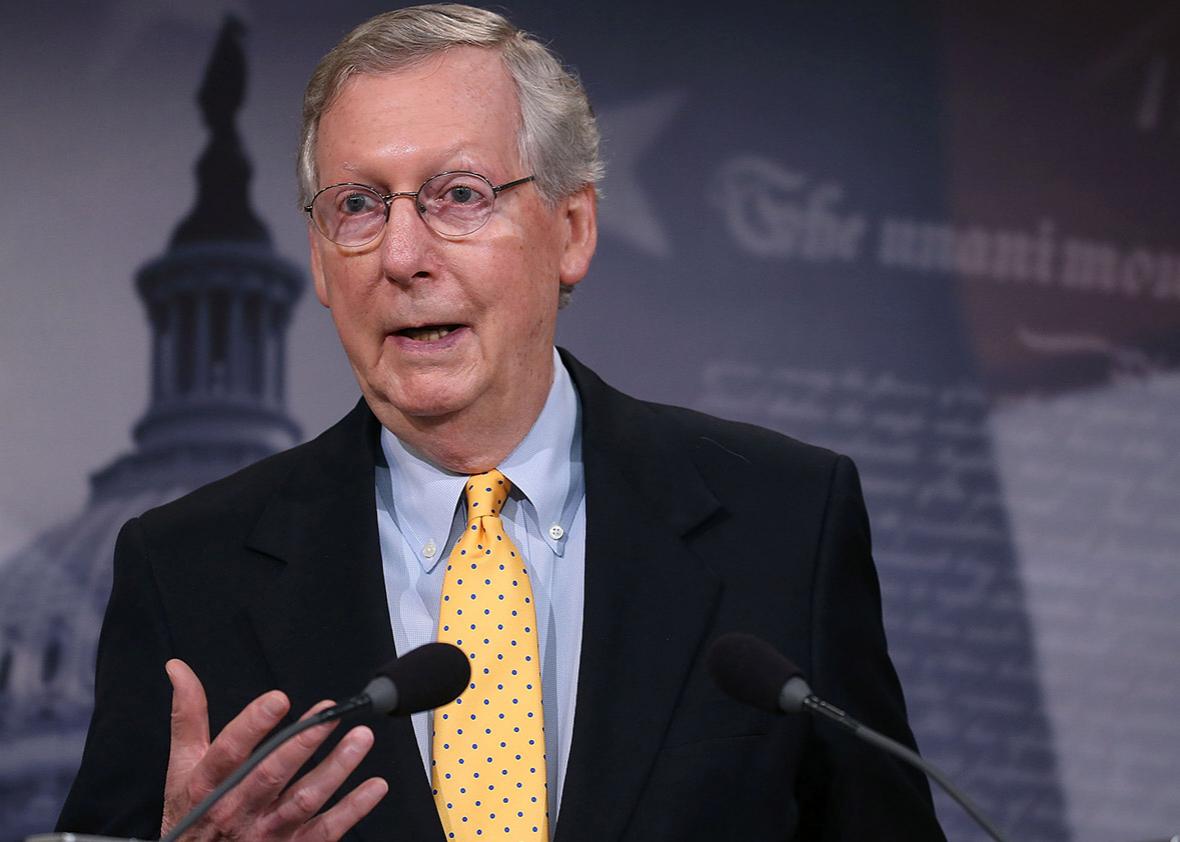So much of the frustration that’s led to the current state of tumult in the House of Representatives can be traced to the continued existence of the Senate’s legislative filibuster.
While the 40 or so House conservatives—the so-called Freedom Caucus—who refuse to bow to any potential leader right now paint their objections in terms of “fight” or “spine,” the bigger problem is math: None of their high-profile partisan bills can escape Congress because of the Senate’s 60-vote procedural rule. Even without that rule, plenty of these bills would still earn a veto from the president. But moving a funding bill written on conservatives’ terms out of Congress would at least apply more pressure on the president to sign it. And more importantly, in the not-so-distant future: If Republicans can retain control of Congress in 2016 while picking up the White House, the legislative filibuster will be their only impediment—and if it isn’t reformed, the source of unthinkable rage among the grassroots right.
Which makes it so peculiar that some of the conservatives who complain most about the lack of fight in their leaders are the most hesitant to reform the filibuster.
Tedious people frequently describe Senate Majority Leader Mitch McConnell as a Senate “institutionalist.” As if the senior senator from Kentucky licks the well of the chamber clean each night before retiring to bed in his Henry Clay–themed pajamas and nightcap. A more apt label for McConnell would be “master political operator who robotically follows whatever path political incentives have laid out for him.” It wasn’t a very “institutionalist” move, for example, to decide in 2009 to filibuster every agenda item congressional Democrats and the Obama administration could conceive of. In terms of scorched-earth partisan politics, though, it was an extremely effective procedural innovation—so successful that his Democratic counterpart, Sen. Harry Reid, has deployed the filibuster just the same way, and with just as much success, since his “demotion” to minority leader.
So give McConnell some credit: The institutionalist made it a full nine months as Senate majority leader before changing his tune on filibuster reform. Perhaps recognizing that grassroots conservatives would be coming for his head after lopping off John Boehner’s, McConnell last week blessed a new “special task force to explore changes to the filibuster rule and other procedural hurdles—including whether to eliminate filibusters on motions to proceed to legislation,” the Hill reported. A mix of Senate Republican veterans and freshmen will constitute this blue-ribbon commission.
One would have expected rejoicing in the streets from conservative movementarians that McConnell had finally opened the door to eliminating the obnoxious 60-vote rule that he himself perfected, under a different set of circumstances, a few short years ago. Instead, one of the first statements that came out of the conservative pressure-group world was a scream from FreedomWorks, the Tea Party–aligned group, arguing against any changes to the filibuster.
“The Senate is supposed to be the ‘world’s greatest deliberative body,’ but any weakening of the filibuster will lead us further down a slippery slope where reactionary policies are rammed through the chamber without any serious debate,” FreedomWorks legislative affairs manager Josh Withrow said. “Simply put, the Senate is the last check on impulsiveness and majority rule. Limiting the profound deliberation for which the chamber is known will come back to haunt Republicans should they once again become the chamber’s minority party.”
That is the conservative position in its most traditional sense: If the ideological purpose is to slow federal lawmaking to a halt, then the filibuster is conservatives’ best friend. These are precisely the terms with which another surprising filibuster reform opponent, Sen. Ted Cruz—who sees each mathematical impossibility as one that must be “fought” against—describes his position. “The legislative filibuster slows down legislative action in the Senate,” Cruz told reporters in September, “and I believe that, over time, protects human liberty by slowing down the expansion of government.”
An interesting theory of politics. But here’s another one: The filibuster is super annoying, and conservatives have a lot they’ll want to get done under a hypothetically Republican president and Congress in 2017. If they want to repeal Obamacare and cut individual tax rates by trillions of dollars, they will either need to come up with the most creative budget reconciliation package of all time, or they will need to carve up the filibuster.
The question of what is to be done about the filibuster puts conservative ideology and conservative practice in pursuit of ideological ends in direct conflict. “Over time,” as Cruz says, conservatives believe that a better-greased pathway for legislation leads to bigger, bloated government. But conservatives also believe that serious conservative legislation rolling back the liberal achievements of the Obama administration (and Johnson and Roosevelt administrations) is needed immediately to save America from financial ruin, tyranny, famine, the apocalypse of liberty, and what have you.
Which side will prevail? Well, think for a second about how angry the conservative base is at the lack of progress on their issues right now, and then consider how they might react to a Republican Congress and White House telling them, in 2017, that they can’t pass anything because of this one Senate rule that they’re capable of eliminating at any time.
